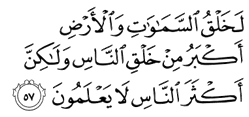Harmony, Spending Wisely, External Laws
Issue 918 » October 28, 2016 - Muharram 27, 1438
Living The Quran
Harmony
Ghafir (The Forgiver) - Chapter 40: Verse 57
 "Certainly the creation of the heavens and the earth is greater than the creation of human beings; yet most people recognize not [such a significant fact]."
"Certainly the creation of the heavens and the earth is greater than the creation of human beings; yet most people recognize not [such a significant fact]."
The above verse puts the human being, as a phenomenon in perspective with regard to the gigantic cosmos with its huge galaxies, solar systems, stars and planets. Such an enlightenment gives the human being a balanced view of higher place in the universe, since he/she may be inclined towards over-estimating himself/herself as a result of the natural forces which the Creator has made subservient to his/her human mind, although this is also a divine gift. The Quran refers to the creation of the whole cosmos and its perfect order, and to the human being and the spiritual, intellectual, moral and physical powers granted by God to him/her which have to be used in totality to develop the human being and maintain and further develop the resources of the universe made subservient to him/her. In this balance, a human-centered view of the world appears to be obviously nonsense. On the other hand, a view that sees the human being as a helpless creature in such a gigantic universe is no less mistaken. Through the belief in God and by following the guidance of His message, harmony is secured within the whole creation, and the human being can avoid both arrogance and defeatism.
Compiled From:
"Concepts of the Quran" - Fathi Osman, p. 45
Understanding The Prophet's Life
Spending Wisely
The spiritual nature of the Shariah highlights psychological virtues and moral perfection in contrast with the evil motives that mostly occur to corrupt rich people, causing them to misuse the Provider's (God's) blessing. This characteristic has prevented the Shariah sources from explicitly encouraging people to acquire wealth and property and expounding the virtues of that pursuit. The reason for this is to avoid adding the religious exhortation to human beings' natural impulse to acquire wealth.
In an authentic Tradition, the Prophet (peace be upon him) is reported to have said:
By God, I am not afraid that you will become poor, but I am afraid that worldly wealth will be given to you in abundance as it was given to those [nations] before you. You will start competing with one another for it as the previous nations competed for it, and then it will divert you [from good] as it diverted them. [Bukhari, Tirmidhi, Ibn Majah]
He thus compared the condemned type of competition to that of previous nations, that is, the type of competition whereby people would totally devote themselves to the pursuit of material wealth instead of competing for virtues and moral values. Indeed, such ferocious competition for worldly wealth might even cause people to disprove many values and qualities of human spiritual and moral perfection for the sake of acquiring and accumulating wealth.
Therefore, the Shariah has contented itself with simply not forbidding human beings to acquire wealth by legitimate means and with showing the various aspects of good and evil that might ensue from the different ways of spending it. The aim is to use the tools of desire and fear to persuade people to spend their money wisely and avoid misusing it.
Compiled From:
"Treatise on Maqasid Al-Shariah" - Ibn Ashur, p. 275
Blindspot!
External Laws
The human influence on the course of history depends on the level of willpower and consciousness. The greater the spiritual strength of the partakers in historical events, the greater is their independence from external laws. The conditionality here is in reverse proportion to the activity of the subject. In principle, man is completely free, and external laws have no power over him. He has managed with his willpower to resist illnesses and dangers. Man, if he found himself among lions, would be lost, but this evident law does not apply to a lion tamer. History is a continuing story about small groups of decisive, courageous, and clever people who have left an indelible stamp on the course of historical events and managed to change their flow.
The power of objective circumstances increases to the same degree as the individual factor decreases, as it becomes more and more inert - that is, as the subject becomes less of a man and more of an object. We have power over nature, and over history as well, if we have power over ourselves. This is Islam's attitude toward history.
Such an essentially Islamic view of historical movements can efficiently explain the flow of history and also determine the share of people in historical events; their power over historical events, and the limits of that power; the distinction between what man can do and what he must do as a subject of historical occurrences. This attitude explains the creative influence of ideals on historical reality and the changes of this reality through man's will and energy. On the other hand, it also explains the role of objective factors, the necessity of relying on facts. It rejects both historical determinism and any empty idealism not rooted in reality. Facts and ideas, and so reality and man, assume in this concept their proper measure.
Compiled From:
"Islam Between East and West" - Alija Ali Izetbegovic, p. 233